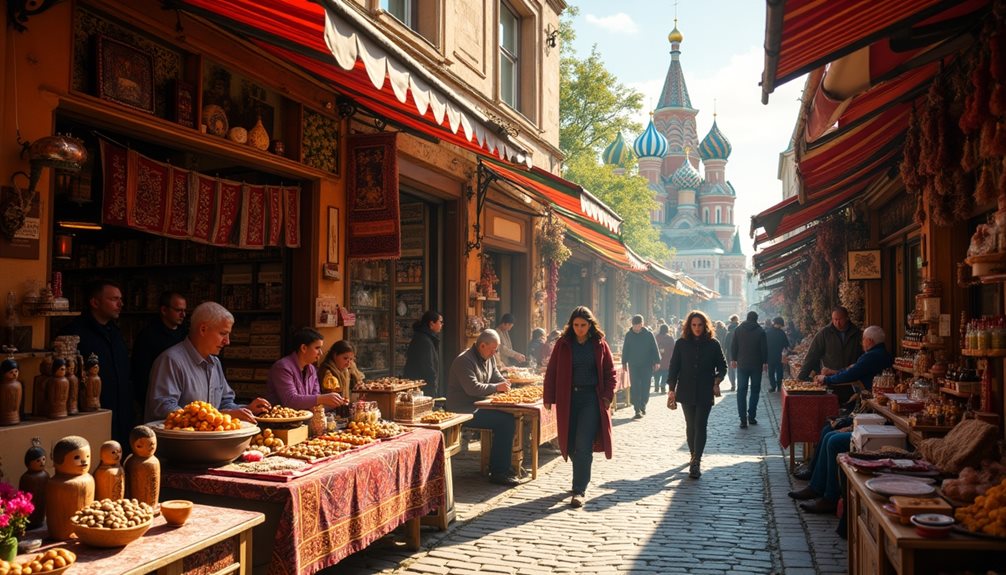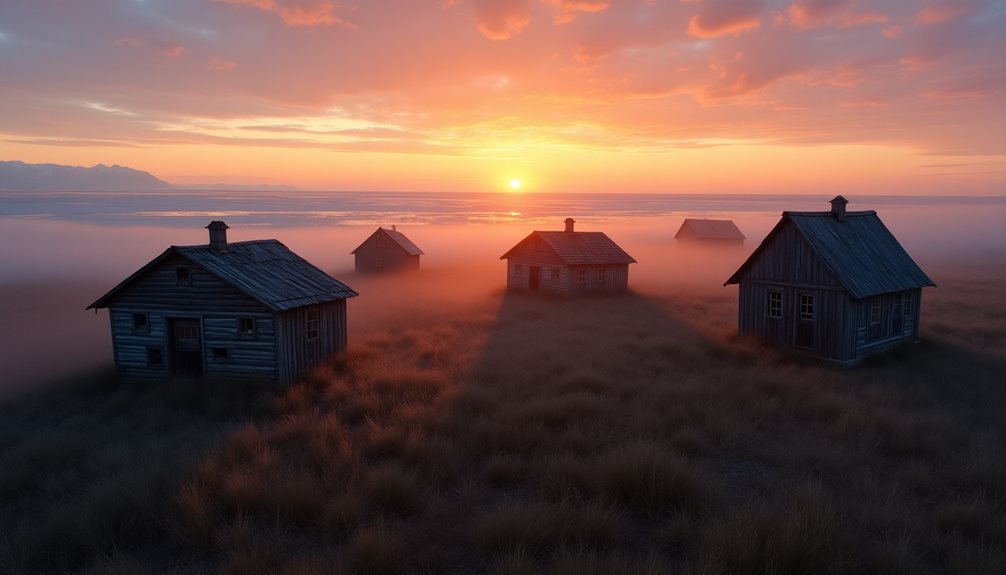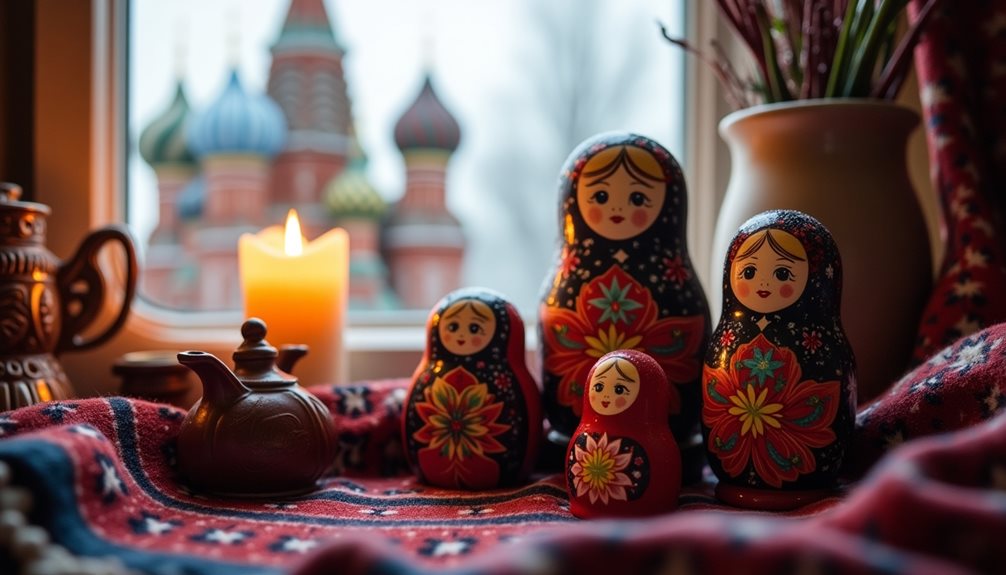In Russia, May unfolds as a mosaic of memory and renewal. The month is marked by significant holidays that evoke a sense of collective identity. As families gather to honor the sacrifices of the past, they also embrace the rejuvenating essence of spring. Each celebration serves as a reminder of shared heritage and unity. Yet, beneath the surface of festivity lies a deeper exploration of what these traditions mean for contemporary Russian society.
Introduction
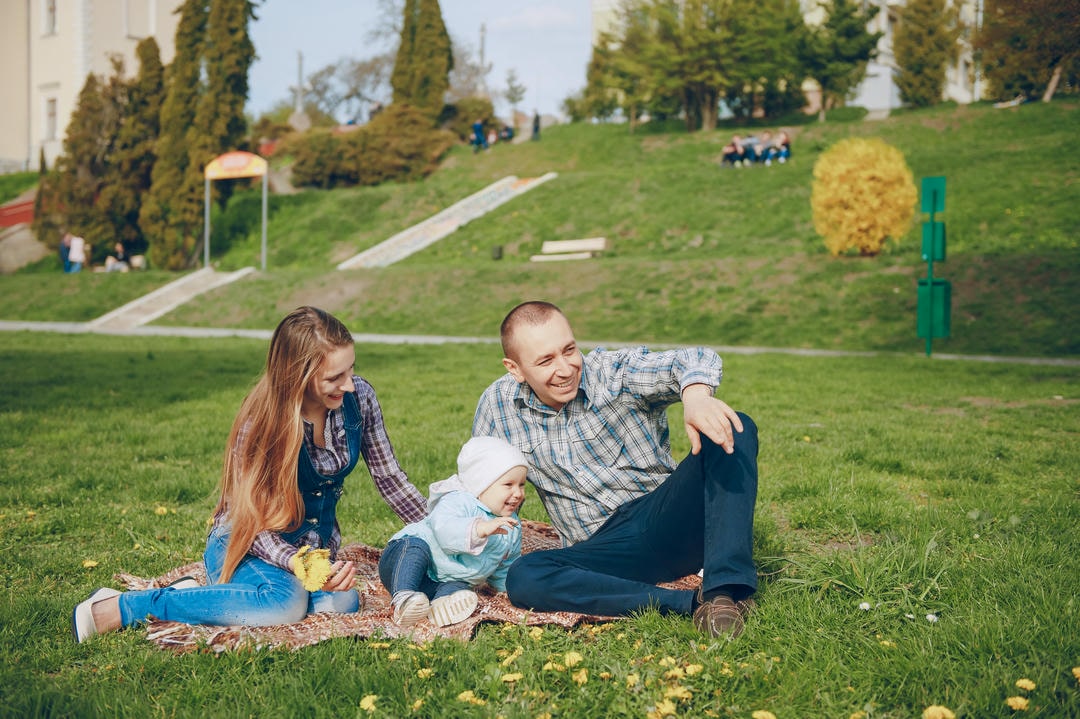
As Russia enters May, the cultural landscape transforms, revealing a rich array of traditions and celebrations that reflect the nation’s history and diversity. This month marks a significant shift, where seasonal changes revitalize long-standing customs, bringing families together to honor shared experiences and collective heritage.
May: A Month of Remembrance and Renewal
May is a poignant period of remembrance and renewal in Russian culture, where past and present intertwine in meaningful ways. The month is characterized by remembrance rituals honoring fallen heroes, reflecting a collective memory that shapes national identity. These rituals underscore the resilience and unity of the Russian people, highlighting the deep emotional connections that define their culture.
Seasonal traditions, such as the blossoming of flowers, symbolize the cycle of life and renewal. This invites introspection and gratitude, making family gatherings sacred moments for sharing stories, reinforcing bonds, and passing down cultural reflections. May serves not only as a time to commemorate but also as an opportunity for renewal practices that rejuvenate the spirit and foster connection.
Springtime Celebrations
Springtime holidays hold a significant place in Russian culture, embodying vibrant expressions of renewal and communal spirit. These celebrations are steeped in rich spring traditions that emphasize the importance of family gatherings and communal activities. Each holiday fosters a sense of unity among communities, as families come together to honor customs passed through generations.
The lively atmosphere of spring is reflected in shared meals, outdoor festivities, and traditional rituals, showcasing the enduring connections between individuals and the natural world. Ultimately, these holidays symbolize hope and rebirth, resonating deeply within the Russian identity. They highlight the nation’s capacity to find renewal and strength in its collective heritage, making May a truly special time in Russian culture.
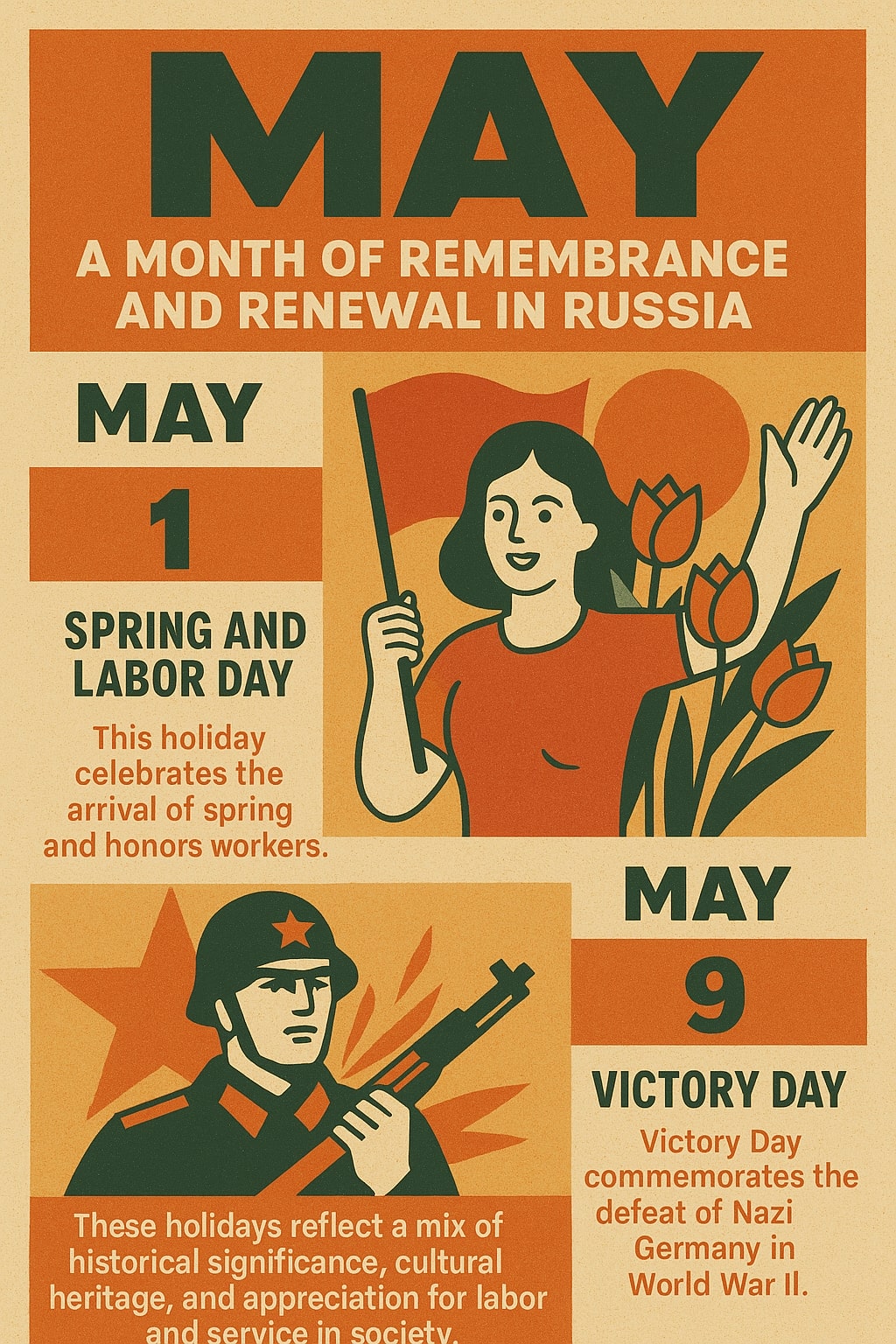
May 1: Spring and Labor Day
Celebrated annually on May 1, Spring and Labor Day in Russia is a joyful occasion that blends the arrival of warmer weather with a tribute to the contributions of workers. This holiday reflects both the renewal of nature and the enduring value of productive labor, making it a cherished tradition across the country.
Seasonal Renewal and Festivities
As spring blossoms, communities come alive with celebrations that emphasize unity and connection. Families and friends gather for picnics in parks, enjoy outdoor games, and share meals under the sun. Public spaces are filled with vibrant parades, concerts, and cultural performances that bring people together in a spirit of optimism and joy. These activities highlight the importance of community while celebrating the beauty of nature’s awakening.
Historical Significance
The origins of May 1 date back to international labor movements in the late 19th century, when workers advocated for their rights. In Russia, it became an official holiday after the October Revolution in 1917, evolving into a grand celebration during Soviet times. Parades featuring workers, banners proclaiming slogans like “Peace! Labor! May!” and festive gatherings were central to its observance. Today, while its ideological roots have faded, the holiday continues to honor labor and celebrate spring’s arrival in a more personal and family-oriented way.
Modern Traditions
In contemporary Russia, Spring and Labor Day is an opportunity to relax, reconnect with loved ones, and enjoy the outdoors. Many families embrace traditions such as barbecues, hikes, or trips to country homes to prepare gardens for planting. Parks and public spaces host lively events for all ages, including rides, theatrical performances, and music concerts. These modern festivities reflect a blend of historical appreciation and present-day values centered on family, nature, and shared experiences.
A Celebration of Hope
Spring and Labor Day symbolizes renewal, unity, and gratitude for both nature’s beauty and human effort. It serves as a reminder of life’s cycles—of growth after hardship—and inspires reflection on how collective traditions can bring people closer together. For Russians, May 1 is not just a day off; it’s an uplifting celebration that bridges past achievements with future aspirations while cherishing the joys of springtime.
May 9: Victory Day
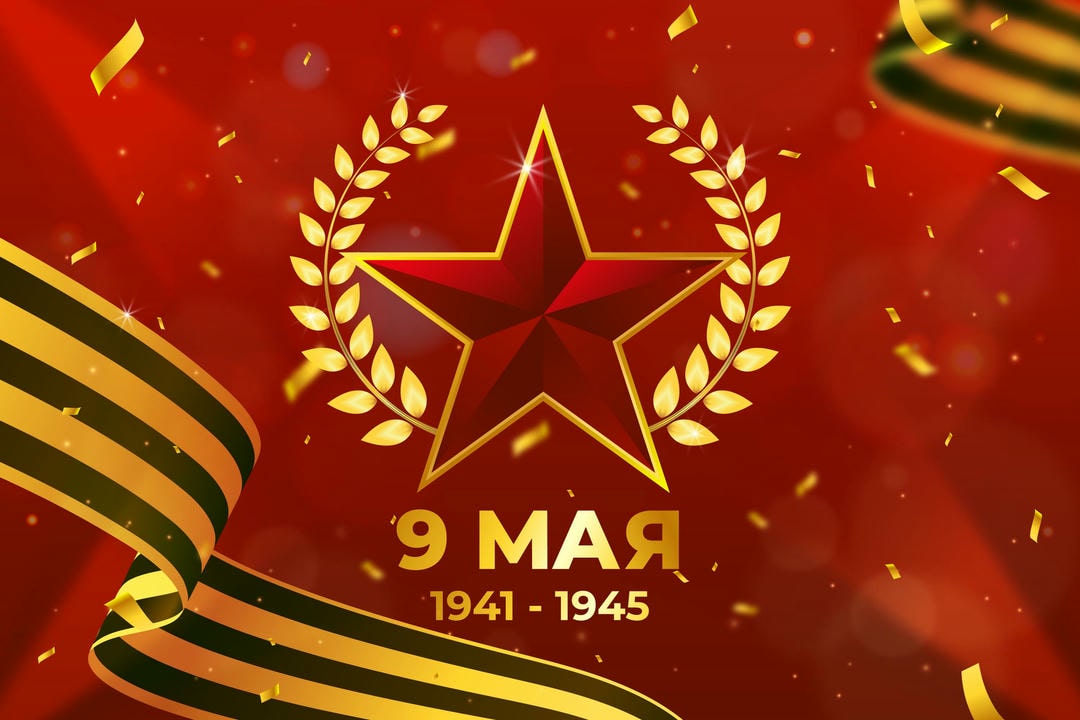
May 9, celebrated as Victory Day, is one of the most significant and heartfelt holidays in Russia, symbolizing resilience, unity, and remembrance. This day honors the Soviet Union’s victory over Nazi Germany in World War II, known in Russia as the Great Patriotic War. It is a time when the nation collectively reflects on its history, pays tribute to those who sacrificed their lives, and celebrates the enduring spirit of its people.
Victory Day: A Tradition of Remembrance
Victory Day is marked by grand military parades held across the country, with Moscow’s Red Square hosting the most iconic celebration. These parades serve as a tribute to those who fought bravely during the war and as a display of historical and cultural pride. Historical artifacts such as Soviet-era T-34 tanks and other wartime vehicles are often featured alongside modern military equipment. The parades are not just about spectacle; they are deeply rooted in honoring the courage and sacrifices that shaped the nation’s history.
One of the most moving traditions is the “Immortal Regiment” march. Families across Russia carry portraits of their ancestors who participated in the war, creating a powerful visual representation of remembrance and gratitude. This event highlights the personal connections many Russians feel to this chapter of history, making it a deeply emotional and unifying experience.
A Day of Unity and Reflection
Victory Day is more than a public holiday—it is a time for families to come together and reflect on their shared history. Family gatherings often become opportunities to share stories about relatives who lived through or fought in the war. These moments help pass down values of courage, resilience, and pride to younger generations while strengthening family bonds.
The day also serves as a reminder of the immense sacrifices made during the war. Over 27 million Soviet citizens lost their lives during this conflict, leaving an indelible mark on Russian society. Victory Day provides an opportunity to honor this legacy while celebrating peace and freedom.
Celebrations Across Russia
The festive atmosphere surrounding Victory Day is felt throughout Russia. Weeks of preparation lead up to vibrant parades, fireworks displays, and community events that bring people together. Historical reenactments and exhibitions allow citizens to engage with their heritage in meaningful ways, while patriotic music fills the air.
As night falls, spectacular fireworks light up the skies across cities and towns, symbolizing hope and resilience. These displays are not only beautiful but also serve as a reminder of the triumphs achieved through perseverance and unity.
A Living Legacy
Victory Day holds a unique place in Russian culture as both a solemn remembrance and a joyful celebration. It encapsulates the enduring spirit of a nation that honors its past while looking toward its future with hope. For many Russians, this day is not just about history—it is about identity, family, and shared values that continue to unite generations.
By participating in these traditions, Russians ensure that the memory of those who sacrificed for peace lives on. Victory Day stands as a testament to resilience, gratitude, and the power of collective remembrance—a timeless legacy that continues to inspire.
Cultural Significance
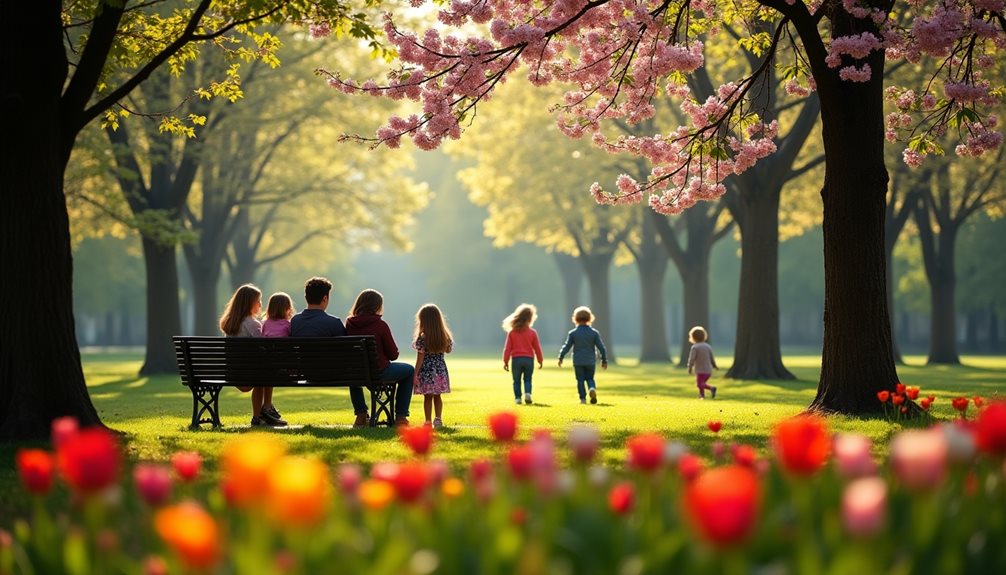
Russia’s May holidays are a time of shared reflection and celebration, bringing communities together to honor their collective history while embracing the present. These festivities highlight the deep connections between cultural heritage and seasonal renewal, fostering a sense of unity across the diverse regions of the country.
The May holidays serve as touchstones for Russian cultural identity, intertwining historical narratives with springtime traditions. Through rituals and remembrance, individuals connect with their ancestry, celebrating resilience and solidarity. These celebrations provide an opportunity to reflect on the past while nurturing a sense of belonging and continuity in modern Russia.
The holidays evoke themes of labor, unity, and pride, reminding citizens of their shared struggles and achievements. Events such as parades and gatherings celebrate the contributions of workers while emphasizing the importance of community bonds. These traditions transcend generations, creating a sense of national consciousness rooted in shared experiences and values.
A Time of Remembrance
May holidays are not only festive but also deeply meaningful. They weave together elements of historical commemoration, family traditions, and cultural heritage. Rituals such as storytelling, marches, and symbolic acts ensure that the sacrifices and triumphs of the past remain vivid in collective memory. This strengthens societal bonds and reinforces a shared narrative that resonates across generations.
Bridging Generations
The May holidays unite Russians of all ages, fostering intergenerational connections through shared traditions. Families gather to honor their heritage, passing down stories and customs that preserve cultural continuity. Community celebrations bring people together in vibrant public spaces filled with music, games, and performances that reflect the joy of springtime renewal.
A Celebration of Resilience
Ultimately, Russia’s May holidays embody resilience and hope. They inspire reflection on history while encouraging citizens to embrace the future with optimism. By honoring their heritage through meaningful rituals and festivities, Russians strengthen their bonds with one another, celebrating the enduring spirit that unites them as a nation.


